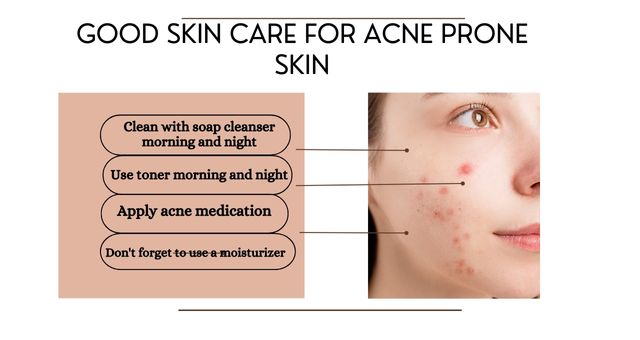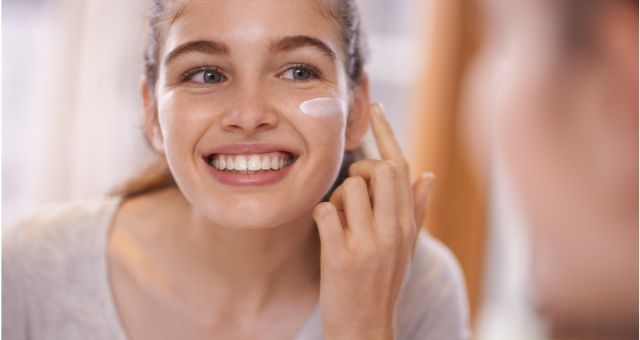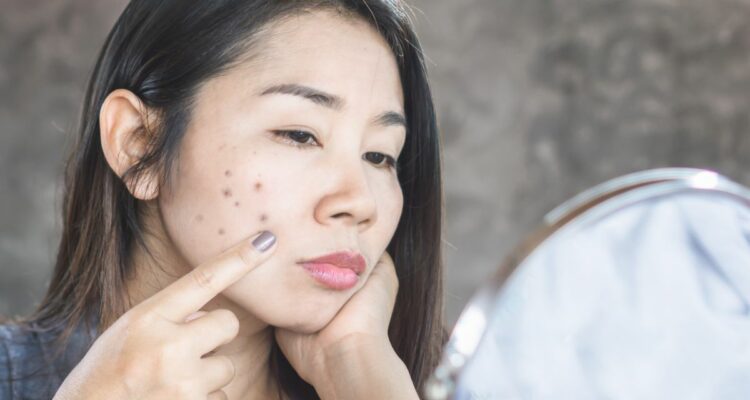Having dry acne-prone skin can be a frustrating and challenging condition to manage. Dealing with both dryness and breakouts requires a delicate balance of skincare practices to keep your skin healthy and blemish-free. In this comprehensive guide, we will explore the causes behind dry acne-prone skin, provide practical tips and recommendations, and offer expert advice on how to effectively care for your skin.
Whether you’re a skincare enthusiast or someone seeking answers, this article aims to provide valuable insights to help you on your journey to clear and nourished skin.
Understanding Dry Acne-Prone Skin:
Let’s first understand Dry Acne-Prone Skin.

Causes and Characteristics
This section delves into the causes and unique characteristics of dry acne-prone skin. We explore factors such as genetics, environmental influences, hormonal imbalances, and lifestyle habits that contribute to this skin condition. Understanding these factors is crucial in developing a tailored approach to skincare.
Building an Effective Skincare Routine
Creating a comprehensive skincare routine is essential for managing dry acne skin. This section outlines the fundamental steps to include in your daily regimen. From cleansing to moisturizing and treating acne, we provide a step-by-step guide to help you establish an effective routine that addresses both dryness and breakouts.

The Foundation of Healthy Skin Cleansing
Proper cleansing is vital for maintaining healthy skin, especially for those with dry acne skin. Here, we discuss the best practices for cleansing, including choosing the right cleanser, avoiding harsh ingredients, and incorporating gentle cleansing techniques that do not strip away natural oils.
The Key to Combat Dryness
Hydration is essential to combat dryness, even in acne-prone skin. This section highlights the importance of hydrating your skin and recommends suitable products and ingredients that provide long-lasting moisture without clogging pores. We also discuss the benefits of incorporating facial mists and hydrating masks into your skincare routine.
Balancing Hydration and Acne
Moisturizing is crucial for maintaining the skin’s moisture barrier and preventing excessive dryness, which can trigger acne flare-ups. We delve into the types of moisturizers suitable for dry acne-prone skin, including lightweight gels, lotions, or creams. Furthermore, we provide insights into identifying key ingredients that soothe and nourish the skin.
Targeting Breakouts without Aggravating Dryness
Effectively treating acne while managing dryness requires a tailored approach. We explore different treatment options, such as salicylic acid, benzoyl peroxide, and retinoids, and provide tips on incorporating them into your routine without exacerbating dryness. Additionally, we discuss the importance of spot treatments and the benefits of natural remedies.
Gently Removing Dead Skin Cells
Exfoliation plays a vital role in maintaining clear and healthy skin by removing dead skin cells. We emphasize the importance of gentle exfoliation methods for acne-prone skin and recommend suitable exfoliants that promote cell turnover without irritating or
Nourishing from Within Diet and Lifestyle Considerations
The condition of your skin is not solely dependent on external factors. This section discusses the impact of diet and lifestyle on dry acne-prone skin. We highlight key nutrients, such as omega-3 fatty acids and antioxidants, and provide tips for incorporating them into your diet.
Additionally, we explore the importance of stress management, exercise, and adequate sleep for overall skin health.
Dermatologists and Skincare Experts
When dealing with persistent dry acne-prone skin, it is essential to consult with professionals. We emphasize the importance of seeking guidance from dermatologists or skincare experts who can provide personalized advice, recommend suitable products, and prescribe targeted treatments if necessary.
Embracing a Holistic Approach to Skincare
In the final section, we summarize the key points discussed throughout the article. We highlight the significance of a holistic approach to skincare, which involves understanding your skin, following a consistent routine, making lifestyle adjustments, and seeking professional guidance.
Embracing these practices will empower individuals with acne-prone skin to achieve healthy, balanced, and radiant skin.
Conclusion:
However, Managing dry acne-prone skin requires a thoughtful and customized approach. Individuals can achieve optimal skin health by understanding the causes, implementing an effective skincare routine, and making lifestyle adjustments.
Everyone’s skin is unique, so it’s essential to experiment and find what works best for you. By following the tips and recommendations outlined in this guide, you can embark on a journey toward clear, nourished, and confident skin.
Frequently Asked Questions!!
Q1: What causes dry acne-prone skin?
Dry acne-prone skin can be caused by a combination of genetic factors, environmental influences, hormonal imbalances, and improper skincare practices. These factors can disrupt the skin’s natural moisture balance, leading to dryness and acne breakouts.
Q2: Can I use moisturizers if I have acne-prone dry skin?
Yes, moisturizers are essential for hydrating and nourishing acne-prone skin. Look for non-comedogenic, oil-free moisturizers that contain ingredients like hyaluronic acid or ceramides to replenish moisture without clogging pores.
Q3: Is exfoliation necessary for acne-prone skin?
Exfoliation is beneficial to dry skin, but it should be done gently. Avoid harsh scrubs and opt for chemical exfoliants with AHAs or BHAs that help remove dead skin cells without causing irritation or further dryness.
Q4: Can I treat acne without aggravating dryness?
Yes, it’s possible to treat acne without aggravating dryness. Look for acne treatments that are formulated to be gentle and non-drying, such as those containing benzoyl peroxide or salicylic acid. Spot treatments can be used to target individual breakouts without affecting the surrounding dry skin.
Q5: What dietary and lifestyle changes can benefit acne-prone dry skin?
A healthy diet rich in antioxidants, omega-3 fatty acids, and vitamins can support skin health. Additionally, managing stress levels, getting regular exercise, and ensuring sufficient sleep can improve overall skin condition.
Q6: Should I consult a dermatologist for acne-dry skin?
If you’re struggling with persistent acne and dryness, it’s advisable to consult a dermatologist. They can provide a personalized assessment, recommend suitable treatments, and guide you on the best skincare practices for your specific skin concerns.


